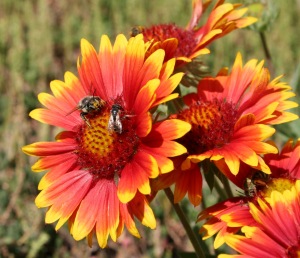By: Sandy Swanson
One of the advantages of living close to The Ohio State University are programs like “Science Sundays.” The College of Arts and Sciences offers monthly lectures on interesting topics like the Great Lakes, Neuroscience, and Bees.
I attended the bee lecture on Sunday. The speaker talked about how bees, as well as wasps and ants, have been able to organize themselves, divide labor, and thrive as a species for more than 60 million years. The interesting part of the discussion is not the behaviors themselves, but how these insects know how to do these things.
There are a few takeaways from the lecture that relates nicely to the human species even though we have time clocks scheduling software, project management tools and staff meetings to organize ourselves and get our work done.
- Noise is good – One of the things the researchers found in working with insects is that a little bit of tension is good when executing tasks. When there is a roadblock, they are able to address it and move on. It’s ok that everything does not always go perfectly. In fact, the outcome is better when they have to overcome some obstacle.
- Specialists vs. generalists – Insects have to be generalists when they are working solo. It isn’t until there are at least seven of them they can divide up the labor. Once they specialize, the system works best when handoff times are quick. Think of it this way. Let’s say you were part of a team, and someone didn’t complete their handoff. You have two choices. You can wait around for them, or go do it yourself. This is what bees do. Some will stay, and others will go back to being generalists.
- Use experience to your advantage – Ants take on easier tasks when they are first hatched, and get more dangerous jobs, like leaving the colony to get food, when they get more experience and approach the end of their life expectancy.
- Make your case and then shut up – Bees have an interesting decision-making process. When it’s time to select a new location for a hive, they send out a few scouts. They will come back, a few promoting Location A and a few promoting Location B, ‘dancing’ to make their case and recruit more scouts. After they finish dancing, they become silent and let the next recruits take over. The next round of scouts mimic the same behavior, dancing and then becoming silent. After a few days, the location with the most “buzz” (sorry, I couldn’t resist!), is the location they choose.
So, what are the big takeaways here. Well, first, we should embrace a little conflict in our work or personal lives. In other words, noise is good. If everything always went according to plan, we would never figure out how to improve processes or make new discoveries.
Next, figure out where you can specialize and where you need a generalist approach. If specialization is not working well, perhaps there is a weak link in the process or a person somewhere along the line. Use experience to your advantage. Maybe this approach is intuitive with parents teaching their young, but are you leveraging experienced workers in the workplace?
Finally, a little silence is golden. Make your case, try to get buy-in, and then let the process evolve. We’ve all been in committee meetings when Mary or Joe monopolized the conversation, even though they couldn’t win their argument but refused to let anyone else take a shot.
Who knew bees and other insects were so interesting? I think I’ll make a “bee-line” to my library to check out a few more books on the topic.
©OrangeBoy, Inc. 2013
Photo courtesy of the Backyard Bee Hive Blog

